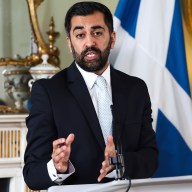WASHINGTON – The U.S. military is targeting major drug traffickers in a new strategy to kill or capture Afghan militants, according to a Senate report that also questions the Obama administration’s deepening involvement in the war-torn country.
An estimated 50 drug lords who help finance the Taliban are on the military’s target list, the Senate Foreign Relations Committee report says. It cites two unnamed U.S. generals in Afghanistan who said the “kill list” was the result of a new interpretation of military rules governing how much force can be used on the battlefield.
“The change is dramatic for a military that once ignored the drug trade flourishing in front of its eyes,” concluded the 55-page report, which will be released Tuesday. A copy of the document was obtained Monday by The Associated Press.
“No longer are U.S. commanders arguing that going after the drug lords is not part of their mandate,” the report found. “In a dramatic illustration of the new policy, major drug traffickers who help finance the insurgency are likely to find themselves in the cross-hairs of the military.”
At the Pentagon, spokesman Bryan Whitman said the military only targets known extremists who are involved in drug trafficking – and not traffickers who have minor interaction with the Taliban.
“Where terrorists do interface with the drug networks, that produces a security threat, a force protection threat, and is a legitimate target in those regards,” Whitman told reporters.
Whitman would not discuss the specifics of the Senate report, which was first reported in Monday’s editions of The New York Times.
For years, the United States has focused on destroying poppy crops that produce more than 90 per cent of the world’s opium, which is used to make heroin. Earlier this summer, the Obama administration announced it was abandoning widespread poppy eradication, which the Senate report said has proven “an expensive failure.”
U.S. intelligence agencies believe the Taliban nets about $70 million annually from the drug trade, and the United Nations Office on Drugs and Crime estimates it could be closer to $125 million. Outside experts peg the Taliban drug profits as high as $500 million.
Despite NATO approval last year to attack drug labs, some U.S. allies are signalling they are uneasy with targeting traffickers.
Antonio Giustozzi, an Afghanistan expert at the London School of Economics, said that while there are good reasons for going after narcotics dealers, such a campaign could carry some “highly undesirable side-effects.”
“Because there is not an exact coincidence between insurgents and drug-smuggling experts, targeting them aggressively might drive the smugglers into the hands of insurgents,” Giustozzi said. “It might … give them an incentive to further weaken the government hold in certain areas.”
NATO spokeswoman Carmen Romero would not comment on the report. “NATO policy is that if there is a direct nexus between drugs and funding the insurgency, then NATO has a role,” she said.
The Senate report concluded that NATO allies operating in Afghanistan agree that “the Taliban cannot be defeated and good government cannot be established without cutting off the money generated by Afghanistan’s opium industry.”
The report said key questions remain about the growing U.S. role in Afghanistan after eight years of war, including:
-Whether any amount of effort will change Afghanistan’s politics and society.
-Why the U.S. is becoming more involved now.
-Whether the American public understands, and supports, what will be needed to win in Afghanistan.
-How the U.S. will define success. The possibilities could include nation-building and keeping extremists from using Afghanistan as a safe haven.
“The administration has raised the stakes by transforming the Afghan war from a limited intervention into a more ambitious and potentially risky counterinsurgency,” the report concluded. “These core questions about commitment and sacrifice can be answered only through a rigorous and informed national debate.”
–
Associated Press writers Raphael G. Satter in London and Robert Wielaard and Slobodan Lekic in Brussels contributed to this report.
r
















